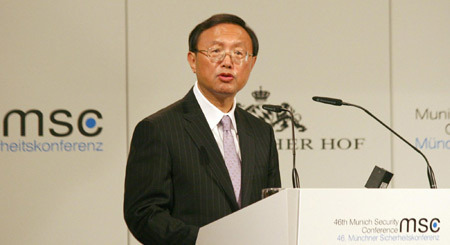FM highlights 'changing China in changing world'
Chinese Foreign Minister Yang Jiechi delivered a major foreign policy speech at the Munich Security Conference on Friday, saying that while focusing on its own peaceful development, China is undertaking more international responsibilities in a transforming and closely-linked world.
Addressing the Munich gathering of senior diplomats and security officials, Yang said that it is a strategic choice that China has made to "seek a peaceful international environment to develop ourselves and at the same time contribute to the cause of world peace through our own development."
Stressing that China is committed to a path of peaceful development, Yang said that a more developed China is an opportunity rather than a threat to the world.
|
 |
|
China's Foreign Minister Yang Jiechi holds his speech during the 46th Conference on Security Policy in Munich February 5, 2010. |
"The argument that a strong nation is bound to seek hegemony finds no supporting case in China's history and goes against the will of the Chinese people," he said.
He also stressed that a more developed China will continue to treat others as equals and will never impose its own will on others.
"The equality we call for is not just equality in form, but more importantly equality in substance," he said, adding "all of us should embrace a diverse world with an open mind."
"We must respect the values and independent choice of the development path of other countries, respect other countries' core concerns and refrain from interfering in their internal affairs."
"In the same vein, China, like any country in the world, will stick to principles on issues affecting its core interests and major concerns, and defend its hard-won equal rights and legitimate interests," Yang said.
With the world peace and development still severely threatened, the Chinese foreign minister also pledged that a more developed China will undertake more international responsibilities commensurate with its strength and status and will never pursue self interests at the expense of the interests of others.
He noted that China has played an active role in the international cooperation on the financial crisis, promoted the establishment of an Asian foreign exchange reserves pool, cancelled the debts of 49 heavily indebted poor countries, and actively taken part in international peacekeeping missions.
"Our own interests and those of others are best served when we work together to expand common interests, share responsibilities and seek win-win outcomes," Yang added.
He urged all countries to strengthen cooperation to tackle the grave challenges to the world security and foster a security outlook featuring "mutual trust, mutual benefit, equality and coordination, respect each other's security interests and pursue security for all."
During his much-anticipated speech, the Chinese top diplomat also elaborated on China's positions on some hotspot issues.
He urged the international community to stay patient and step up diplomatic efforts to seek solutions to the Iranian nuclear issue, saying "Iran has not totally shut the door" on the IAEA proposal on nuclear fuel supply.
Yang called for another meeting of the so-called P5+1 dialogue, which gathers the five permanent members of the UN Security Council plus Germany, to search for a mutually acceptable formula on the issue.
He also said that there was now new opportunity to restart the six-party talks that aims to resolve the Korean Peninsula nuclear issue.
"China will work tirelessly with other parties concerned and the international community as a whole for the denuclearization of the peninsula, the normalization of relations between relevant countries and the achievement of enduring peace and stability in Northeast Asia," Yang said.
On Afghanistan, he affirmed that China would "continue to take an active part in Afghanistan's reconstruction process, and work with the rest of the international community for the early realization of stability and development there."
The presence of Yang has been the biggest highlight of the Munich Security Conference on its opening day. It is the first time that a Chinese foreign minister has attended the 46-year-old annual forum, dubbed as "Davos of security policy."
 0
0 







Go to Forum >>0 Comments